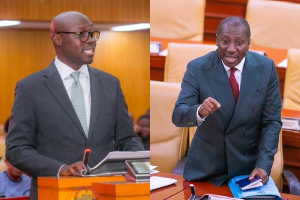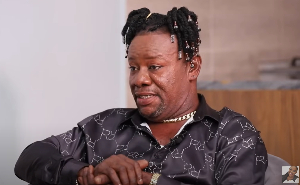But What Has Corruption Got To Do With Ghana’s Development Anyway?
By Dan Agyeman
Transparency International (TI) is at it again and much of the developing world is agog with the yearly useless cacophony and time wasting exercise of debating the meaningless corruption perception index and blaming their political opponents for their country’s position on the table. In Ghana, the debate over the corruption perception index (CPI) will in the next few days or longer, become a predictable political football and serve as an expensive distraction from focusing on the issues that really matter to the well-being of the average citizen. What seems to elude us during this period of distraction is the unchanging fact that whether Ghana is five places lower or higher on the CPI compared to the previous year, the lot of the average Ghanaian has remained virtually in the same deplorable state since independence.
Corruption is defined by TI as the misuse of public office/power for private interest/benefit. This suggests that only public office holders can be corrupt. However, since the most common aspects of corruption, bribery and kickbacks involve a giver and a taker, the thinking is that both should be treated as offenders. Beyond that, there are many other sophisticated forms of corruption within the public corruption context. Corruption is deplored by all because of its perceived negative impact on development. Even the UN has an International Convention Against Corruption. So it would be unwise on my part to swim against the tide. I do not condone any form of corruption. But I do not share all the lip service that blames all our economic development woes on corruption. To me any form of corruption is condemnable as morally wrong but not necessarily as a developmental issue.
The premise of this article is that the perception of corruption as defined by western business, academic, and political elites fails to take into account our all-pervasive Kwaku Ananse syndrome, and therefore is unhelpful in our understanding and consequent efforts to eradicate corruption in our country. A simple example is the concept of gift giving. When does it become a bribe? My point is that perception of corruption is related to a country’s political culture. Therefore, any attempt to globalize the issue without reference to the cultural variability of a particular society is flawed. A sub set of my premise is that the focus on the war on corruption as a development intervention is misleading because the relationship between corruption and underdevelopment does not withstand empirical scrutiny. For example, apart from South Africa, all the BRICS countries, Brazil, Russia, India, and China are deemed more corrupt than Ghana. If corruption is why Ghana is not developing, why is it that massive corruption in China and India have not affected their meteoric economic development?
Many people are too quick to point to foreign influences for the corruption in our society. But as a person who grew up on our glorified Ananse stories, I absolutely reject this explanation. I venture to say that the root of corruption in Ghana is the Kwaku Ananse syndrome. Ananse is a character who is cunning, deceitful, corrupt, conniving, and a cheat. His claim to fame is that he tries to outsmart his family, friends, and opponents alike. I am aware that his antics almost always backfire and that there is a message in every Ananse story about the futility of his evil machinations. But hardly anyone remembers the teachings from the stories. The enduring thing that sticks with children are the elaborate schemes that the great Ananse concocts to outsmart other characters in the story. These are what have been emulated for centuries and have become endemic in our society. Ananse is our number one folk hero.
In my view, the Kwaku Ananse syndrome is responsible for corrupt practices in both our public and private conduct. Since TI focuses on public corruption, my question is what about private corruption, is that also something for us to worry about? And if it is, is it also something we should debate? Let me give a few examples. First, I am on my way to Nkawkaw, I see a ten year old boy selling snails on the side of the road and I stop. He tells me his price. Feeling sorry for his plight, I don’t ask for a reduction and pay him his asking price. How do you explain the boy gleefully and proudly telling his friends “ma twa papa no”? (I have cheated the man) Is that corruption? Second, my sister who operates a small retail business at Makola sends her driver to purchase a spare part for her broken down car. The part costs GH50 cedis, but he brings back a receipt for GH150 cedis. Are her driver and the parts seller who wrote the false receipt corrupt? Third, if I send my driver to buy fuel for my car and he returns with a receipt for twice the amount of fuel purchased, is the conduct of the driver and the petrol seller corrupt? I am sure every reader knows of many more incidents of this type of wrong behavior. Do we seriously expect such people to behave differently when they work as public officials?
Much of the interventions designed to combat corruption tend to place emphasis on education and prevention instead of punishment. This has led to setting up early warning systems and corruption control programs. For example, in the Ghana Police Service, police officers are made to undergo a program known as “Policing in a Democracy” in an effort to control police corruption. While such methods at corruption control are welcome, I prefer the Chinese approach of stiff punishment. Unfortunately, in Ghana, it is both culturally and politically difficult to punish corrupt behavior. The general belief that “Obiara didi n’adwuma ho” (everyone profits from their position), virtually reduces corrupt behavior to a minor indiscretion. When this attitude is compounded by what I refer to as our “forgiveness friendly culture”, and respect for our traditional and religious leaders, it becomes almost impossible to bring wrongdoers to book. In too many instances, our criminal laws are trumped by informal interventions by Chiefs, Bishops and Imams.
So if almost everyone is guilty of the Kwaku Ananse syndrome, and perceived corruption has nothing to do with development, and the accused escape serious punishment because of a forgiveness culture, is it any wonder that we limit ourselves to predictive political football and accuse our opponents of unproven, dubious, and contestable allegations of general corruption to achieve cheap political points? It only shows that we are not serious about corruption. It is an undeniable fact that our friends and family members are disappointed when high public officials do not enrich themselves while in their respective offices. Their rationale and assumption being they would also benefit from such unjust enrichment. If we are serious about both private and public corruption, we must stop seeing corruption only in our political opponents, dissuade our traditional and religious leaders from always begging for mercy, and apply stringent, harsh, stern, severe (take your pick) Chinese style punishments on guilty corrupt officials. But the first step is to disabuse the minds of the children that Kwaku Ananse is a hero. We say he is a folk hero. He is not, and never was.
Finally, let us stop wasting our time on the TI’s meaningless corruption perception index. I would happily take China’s position on the index in exchange for their economy.
Opinions of Sunday, 4 December 2011
Columnist: Agyeman, Dan


















